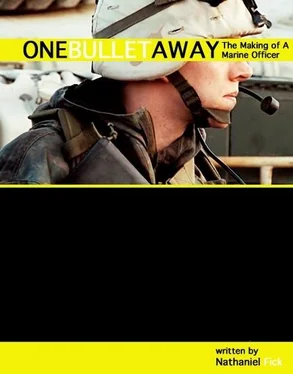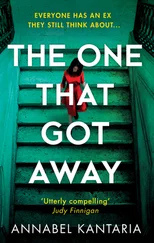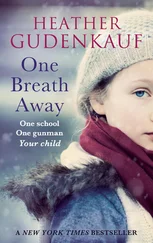We were under orders to disarm the populace but also to avoid getting tangled up in other people’s fights. In Sadr City, I had listened as senior officers had encouraged the revenge killings as a necessary part of Iraq’s eventual stabilization. Some American units were even reported to be distributing captured weapons to anti-Ba’athist militias. Once again, grand strategy and national policy came to a head in a single decision by a small platoon.
“Give him his rifle back, Rudy, and let them go.”
Rudy handed it over, saying, “My enemy’s enemy is my friend.”
“I never thought we’d say that,” I replied. “We’ve spent too much time in the Middle East.”
I felt dirty rearming the peshmerga and lending my tacit approval to their killing spree. But war makes for rational choices that are hard to understand in more reflective moments. I preferred to have as many proxies fighting for us as possible if that meant more killing and dying done by them and less by my Marines. With a conspiratorial wave, the men in the Land Cruiser resumed their hunt, streaking south toward Baghdad.
While escorting the water tanker back to its base, we learned that the battalion was leaving the power plant to move to a new location. I copied the grid coordinates in grease pencil on the windshield and looked at my map. It matched up with a soccer stadium near the presidential palaces in the city center.
I turned to Gunny Wynn. “Looks like we’re moving downtown.”
“Damn, and I was just starting to appreciate the quiet of that power plant out in the middle of nowhere. Just goes to show, things can always get worse.”
I propped the radio on the dashboard and tuned in a news broadcast from London. The announcer reported thousands of Baghdad residents marching to protest the American occupation.
Wynn smiled wryly and said, “Sure am glad we worked our asses off today.”
WE SPENT THE NIGHT on the cool grass of the soccer field built by Saddam’s son Uday. Gunfire echoed around the stadium, and tracers passed low over the stands, but we rested easily in the company of so many other armed Americans. Reyes worked out by flipping through a deck of cards and doing pushups to correspond with the number on each. He sweated through the deck again and again. Jacks read comic books, punctuating his reading with dramatic recitals for the benefit of the platoon. They howled in appreciation and passed around cups of coffee. We felt normal again.
I sat in the grass next to Gunny Wynn while he brushed his teeth. Mullah Mohammed, the boy with the rifle, and the rampaging peshmerga already existed in another world. We had escorted the tanker back to its base and then picked our way through the city to the new coordinates we’d been given for the battalion. I believed that this was just another way station and that the platoon would be back on patrol the next morning. But Major Whitmer pulled me aside when we arrived.
“Hope you had a good day, Nate. That was your last patrol.”
I thought for a second that I was being relieved. Maybe I had pushed back too hard against my CO. “Why’s that, sir?”
“The division’s turning most of Iraq over to the Army. We’re going home.”
Home. Home for me had become a Humvee cab. In its most luxurious incarnations, home was a warehouse or an abandoned building that provided some shelter from the sun and wind. Home could be a hospital in Kuwait or a hospital ship out in the Gulf. Nothing existed beyond that. The concept was too abstract. The word didn’t even register.
It was April 19. The regime had fallen only ten days earlier. We’d been in San Diego ten weeks before that. Everyone expected a deployment lasting six months or a year. We knew the hard part was only beginning. Baghdad still seethed. Gunfire, explosions, crime, death, and disease defined the city. It was enough to keep every last American busy all day, every day, for the coming year. We couldn’t possibly be going home.
“Maybe we’re getting lucky. Straight to Kuwait. First flight home,” Gunny Wynn said, as he leaned toward a side mirror on the Humvee, running an electric razor across his chin.
I stared at him.
“You’re right,” he said. “I don’t know what I was thinking.”
We left the stadium before sunrise to get as far as we could before the day grew hot. By mid-April, noon temperatures already approached one hundred degrees, and they would only get hotter with each passing day and each southbound mile. I traded places with Christeson and stood on the rear bumper of the Humvee, holding on to the upright struts and feeling the wind in my face. I wanted to enjoy one last look at Baghdad.
The city was cool and quiet as pink streaks appeared in the sky and the streetlights blinked off one by one. Dawn is the same everywhere, even in Baghdad. The frenzy of the night was over, and the frenzy of the new day hadn’t yet begun. A garbage truck rumbled down a residential street, stopping as men in coveralls jumped off and emptied the cans. Some residents kept garden plots on the median in the roadway, and stooped men tended their vegetables, waving as we passed. I imagined they had been lifelong farmers who had moved to the city in old age to live with the children they couldn’t keep on the farm. Lights shone from a few upper-story windows, and I wondered at the thoughts of families waking up to their tenth day of freedom. Maybe they’d look out the window and watch us going by. If they saw us, I wondered, what would they see? I couldn’t know. Despite our best intentions, Iraq and its people remained alien to me.
Baghdad’s veneer of routine wasn’t without cracks. An Army patrol picked its way through an industrial park. Tanks manned checkpoints at regular intervals along the road. Most neighborhoods looked untouched by war, but the government buildings towering over them were shells turned black inside. Shock and awe. One highway underpass hid the burned remains of an Abrams tank, a tank retriever, and two supply trucks. Their sad story begged to be told.
At sunrise, we passed the blue clamshells of the Martyrs Monument, a tribute to the Iraqi dead in the war with Iran. Public memorials appeared to be one thing the Hussein regime had done right. This one soared above the surrounding homes, opening, closing, and changing shape with the shifting perspective of our movement. The monument’s beauty, after so many weeks of mud brick and wreckage, was staggering. Near a sign for Saddam International Airport, the battalion turned south on Highway 1 and left Baghdad behind.
The sun beat down between billowing clouds. Riding with my head pitched back, I watched them swirling and changing shapes. No smoke. No jets or helicopters. No gunfire, no mortars, no turtling inside my body armor. All we needed was music. I played with the shortwave, but the choices were the BBC, Arabic talk radio, and religious chants. Six hours south of Baghdad, we pulled off the highway into a field of reddish clay. I observed the ritual of emplacing the machine guns at hundred-meter intervals and sketching a fire plan, but it was a struggle. As quickly as we’d been thrown into the war, we were being withdrawn even faster.
We dallied in the field for three days. Surely, we mused, there had to be a power plant to guard, a school to rebuild, a convoy to escort, or even a plane leaving Kuwait City with a few empty seats to fill. Anything beat roasting in the dirt and debating our future. On the second night, three combat engineers attached to the battalion were marking an Iraqi minefield along the side of the road. One of them stepped on a small antipersonnel mine. The blast tore his leg off at the knee and liquefied the eye of a Marine standing next to him. When I told the platoon about the accident, Espera shook his head. “There are a thousand ways to die,” he said.
Читать дальше












